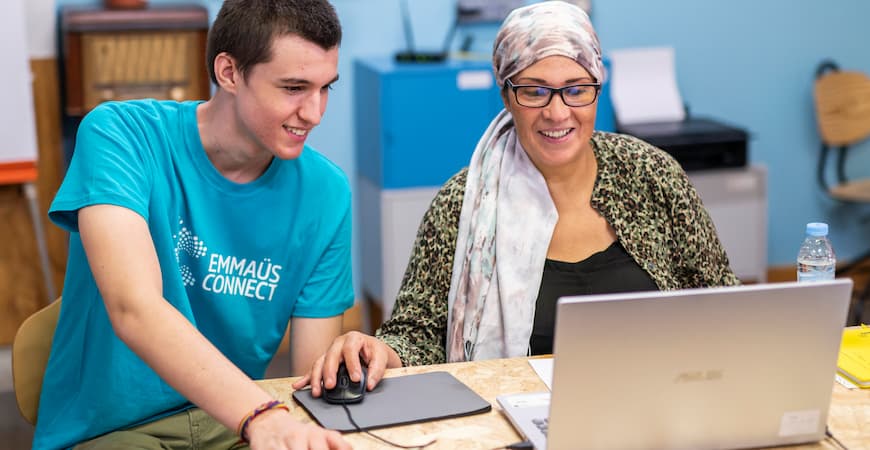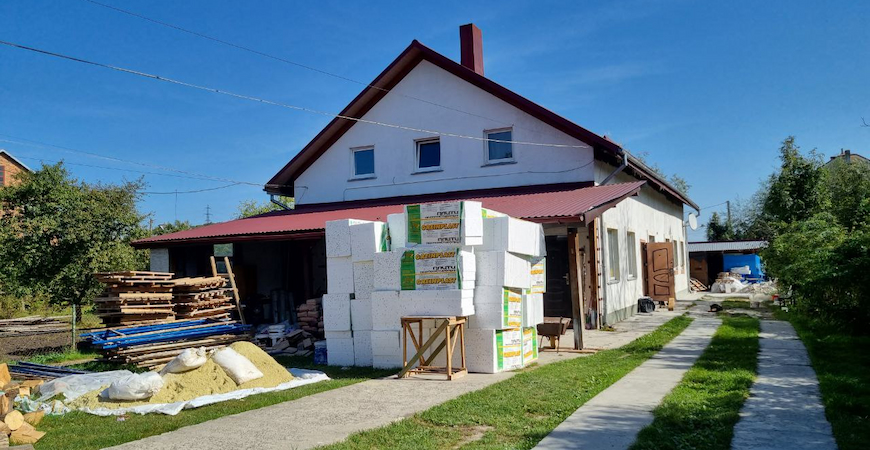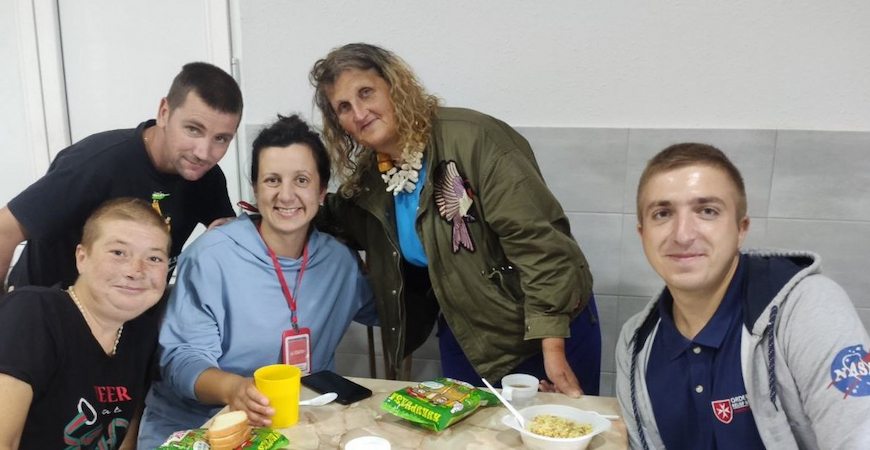Marie Tixier
Tackling digital exclusion
Further afield in Europe with Emmaus Connect
Emmaus Connect is a French group created in 2013, which promotes digital inclusion for people experiencing social and digital exclusion. We met up with Lilan Criscuolo, who is in charge of international partnerships, to hear what she has to say about future plans for Europe.
After expanding rapidly in France (where the organisation is active in 18 areas, has 12 drop-in centres and has helped more than 137,000 people), in 2023 Emmaus Connect decided to explore the possibility of developing this type of activity in Europe, in partnership with Emmaus groups wherever possible.
Lilan, can you tell us how the idea of extending this project to other countries came about, and what steps have been taken?
Over the last ten years, Emmaus Connect has developed expertise in digital inclusion, focusing primarily on the situation in France. Yet given the major challenges in Europe (42% of citizens lack basic digital skills, even though they are essential in over 90% of jobs), we wanted to explore the issue of digital exclusion in other countries.
Moreover, one of the key missions of Emmaus Connect is to help social work services meet the challenges of digital inclusion – in France, we have trained 13,000 social workers and equipped 500 social welfare facilities. We decided to pursue this approach as part of a Europe-wide project.
This is how our partnership project got off the ground at a European level. The aim was to improve our knowledge of the challenges in other countries affected by the digital divide, while meeting actors and drawing inspiration from good practices, along with sharing our experiences.
In 2023, we launched a training project for social workers, with support from the Erasmus+ programme, in collaboration with Emmaus Satu Mare in Romania and Liberittutti, a social cooperative in Italy.
What are the results of this project?
In 2023, our three organisations worked together to reach several objectives. A field study was conducted on the obstacles to using digital technology in Romania and Italy, both for people experiencing exclusion and social welfare organisations. As a result, each partner was able to better understand the specific challenges in their own country, identify local initiatives and even extend their network of partners to facilitate the inclusion of the target groups.
New professional training modules were developed by Emmaus Connect and were successfully tested by 19 social workers in Turin (Italy) and Satu Mare (Romania). These professionals were informed about the challenges of digital poverty, trained on how to adapt teaching resources and taught the basics of designing workshops.
Having achieved our training objective of the social initiative, we are now focusing on sharing the results of the project, in the hope that they will benefit other non-profit organisations and social welfare services, in order to improve digital support for the most vulnerable members of society.
So, what’s next?
Through this project, various social and environmental issues linked to digital technology have been identified, paving the way for new initiatives.
A number of possible projects have emerged: continuing to train social workers to support people experiencing exclusion, facilitating access to high quality educational content and pedagogical resources, bolstering access to digital hardware through the collection and re-use of equipment, and even tackling tomorrow’s digital inclusion issues, such as digital citizenship.
On the strength of this initial experience, we would like to respond to these challenges together with other Emmaus groups, to facilitate the sharing of expertise and exchanges of good practices, while taking action on a large enough scale to help bridge the digital divide across Europe.
For further information, visit https://emmaus-connect.org/

© Emmaus Connect
Three European projects supported by the Abbé Pierre Foundation!
Every year Emmaus Europe works with Emmaus International to present projects put forward by the groups in Europe (excluding France) to the Abbé Pierre Foundation. The projects must be focused on the topic of improving housing conditions.
This year 3 of the 8 international projects that were chosen to be given support by the Foundation are European projects!
IFS-Emmaus – Bosnia-Herzegovina
The group will receive support in order to build housing for two single-parent families that have suffered from domestic violence. Social services put the group in touch with these families.
Emmaus Oxford – UK
The group will receive support in order to build 10 bathrooms. This amount will be part of a renovation project for two adjoined houses with the goal of providing dignified housing for 10 companions in an autonomous setting – a final step of sorts in their transition towards leaving the community.
Emmaus Oselya – Ukraine
The last project selected for support will benefit from funding by both the Abbé Pierre Foundation and Emmaus Europe: due to the Covid-19 pandemic and then the war led by Russia, this Ukrainian group has doubled the number of people it hosts over the last 3 years. And it has done so in an emergency context. This welcome has been provided thanks to the selfless commitment of all of the members of the community and by transforming certain shared spaces into new bedrooms.
Thanks to joint funding from Emmaus Europe and from the Abbé Pierre Foundation and by using some of its own funds, the group has now been able to start the building works: renovating an old workshop and transforming rooms into bedrooms. This project will provide a more dignified welcome to the companions and will help replace the shared spaces that have been transformed into bedrooms over the last few years. The building work should be finished before winter hits!

Emmaus Oselya’s old workshop is going to be transformed into a community house. © Emmaus Oselya
Despite the war the Oselya group is continuing its fight against poverty
Emmaus Oselya is continuing with its work to support vulnerable people whilst also continuing to lead its income-generating activities. This group fights to offer dignified living conditions to the thousands of vulnerable people who are living in the Lviv region as well as to the victims of the ongoing conflict.
For several years Emmaus Oselya has distributed 150 hot meals to vulnerable people on Thursdays. In 2023 the group has distributed over 5,700 meals thanks to the funding provided by the Ukraine Fund.
In addition to all of this Emmaus Oselya also offers various services at its new day centre that was opened in January 2023 and that was largely funded by the Ukraine Fund (a fund that has been built thanks to the contributions of many Emmaus groups from all across the globe). In the 9 months that the centre has been open it has done a great job: the centre has welcomed over 1,346 people, including 492 internally-displaced persons.
Welcoming more people within the community
Since the start of the conflict Emmaus Oselya has been hosting 10 internally-displaced persons as companions. Since 2021, due to the pandemic and then the outbreak of the war, the group has doubled the number of people it welcomes, up to 30 companions from 15.
In September 2023 the group learned of the death of Nazar, a former companion of the community. He died in the fighting at the age of 29. A portrait of Nazar can be found on Facebook. Just to remind you that 15 companions have left for the front since the conflict broke out in February 2022.

© Emmaus Oselya



